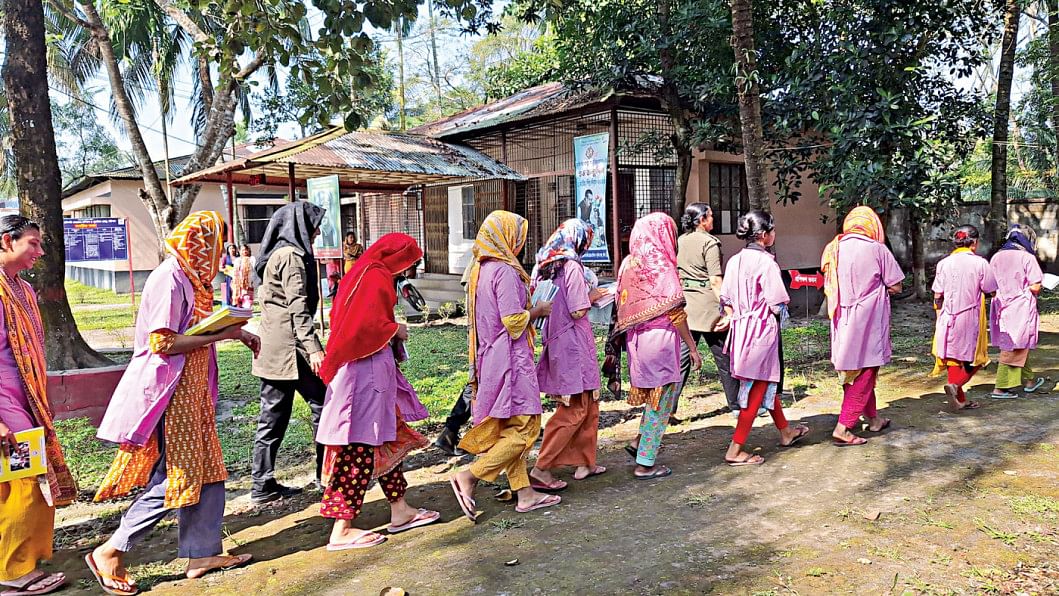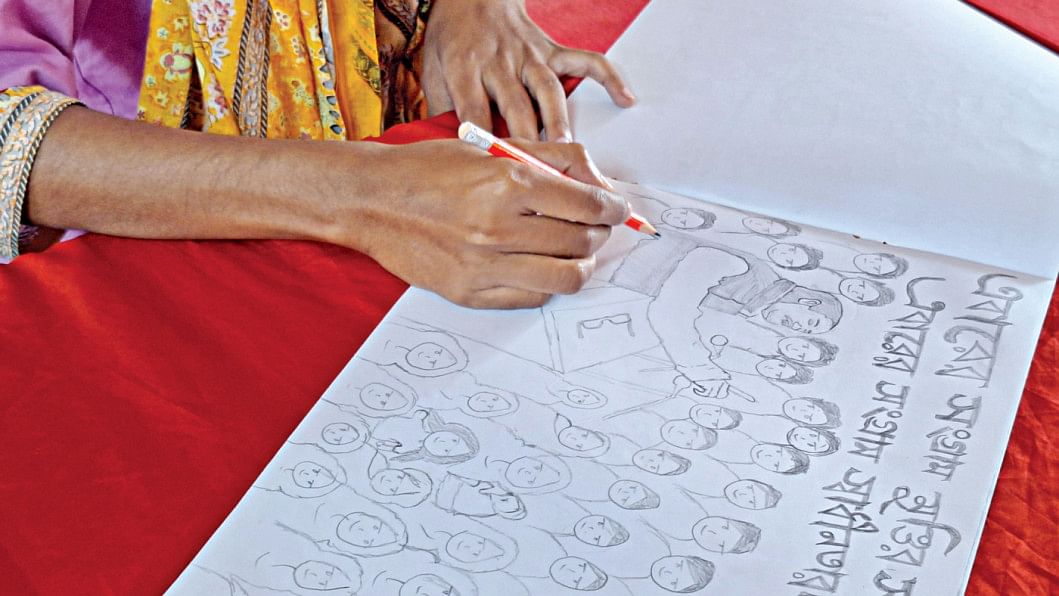To be able to dream again
At first glance it looks like a happy gathering of women and girls spanning ages from 15 to 50 years. We are greeted by this group of 30 and they welcome us with a song and dance routine. Their smiling faces, however, belie the trauma they have gone through and survived. Victims of torture or sexual violence, they now find some solace at the Training and Rehabilitation Centre for Socially Disadvantaged Women in Barishal.
Though they were once strangers, fate has brought them together. They are now a close-knit family; they sing, dance, cook and share their stories of joy and sorrow as they stitch beautiful patterns on Nakshi Kantha at the centre run by the Department of Social Services.
Shabana, (pseudonym) is the team leader of the group. She relates her story:
"I do not know who my parents are. I grew up in an orphanage in Chattogram. From there I stayed in the district's government children's home for 18 years,"
"A person brought me to Dhaka from there as his daughter. But he used to torture me all the time. With the help of a family, I was rescued from there and they brought me to Barishal on September 7, 2019. But the houseowners used to beat me there with an iron rod."

Locals of the area, when they found out she was being tortured, informed the police who then sent her to the victim support centre. From there, Shabana was transferred to the rehab centre.
"I just want to learn how to make handicrafts and be able to earn my own living and be accepted in society," says Shabana, her eyes, brimming with tears.
According to the Social Services officials, Shabana is quite talented; she can draw, dance, cook, and sew very well. Whenever any guests come on visits, Shabana leads the welcome dance. She has already earned around Tk 8,000 by sewing colourful Kantha.
Md Jasimuddin, a staff member of the centre, explains that they have been selling the Kanthas prepared by the girls and the earnings are deposited in the girls' accounts. The girls have earned over Tk 50,000 in the last year by selling various handicrafts.
Twenty-one-year-old Ferdous Ara, (not her real name), grew up with her maternal uncle and aunt in the Sirajgan district. She never felt loved by her aunt who would physically torture her and give her only one meal a day. So, one day she decided to run away, marrying a bus driver in Dhaka.
Sadly, within a year, her husband died, and she left Dhaka for Barishal in search of work.
With no work and no money, Ferdous started foraging for food from dustbins. Noticing this, police sent her to the Centre.
That was three years ago. Ferdous is a much stronger person now; she wants to get married and start a new life.

Purnima, 18, (not her real name), was sold by her husband so that he could raise some gambling money. She too was rescued by police and sent to the Centre.
One of the Social Services officers says that the Centre has successfully rehabilitated around 271 girls and women in the last 20 years, out of whom 18 are now married and leading happy lives. The Centre provides the girls with training in handicrafts, beauty salon services, dance, singing, home management, cooking, as well as basic education.
But considering the trauma all these women and girls have endured, the Centre does not have any counselor.
According to the database, the Department of Social Services started the rehabilitation centre for socially disadvantaged girls and women in the 2002-2003 fiscal year. The main purpose was to help them reintegrate into society by providing them protection, education, vocational training, mental development.
Girls below 18 years old, who have been forced into sex work or have been victims of physical or sexual abuse are rescued and taken to the Centre.
Currently, there are four rehab centres in Faridpur, Kushtia, Barishal, and Sylhet-- with a capacity for 100 individuals. Till November of 2023, the Centre has taken in 1,038 girls.
"Many of these girls (and women) are very smart and talented" says Sazzad Parvej, manager of the rehabilitation centre in Barishal. "We are trying to provide quality training so that these girls have opportunities to be employed in good professions," he adds.
The Centre has limitations, especially resources, but it has given these women and girls a sense of belonging and the ability to dream of establishing themselves in society, no matter what the odds are.

 For all latest news, follow The Daily Star's Google News channel.
For all latest news, follow The Daily Star's Google News channel. 

Comments